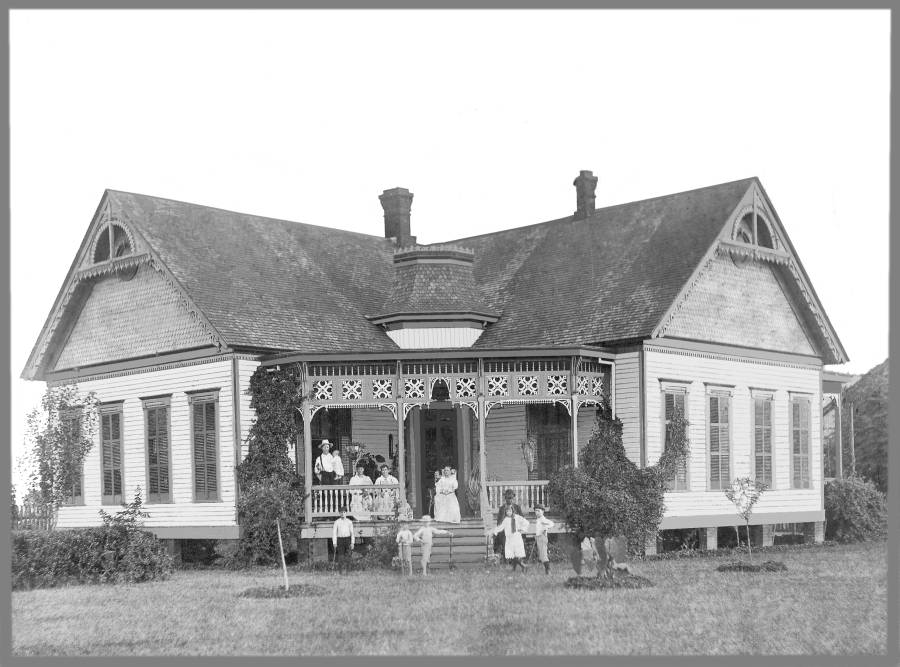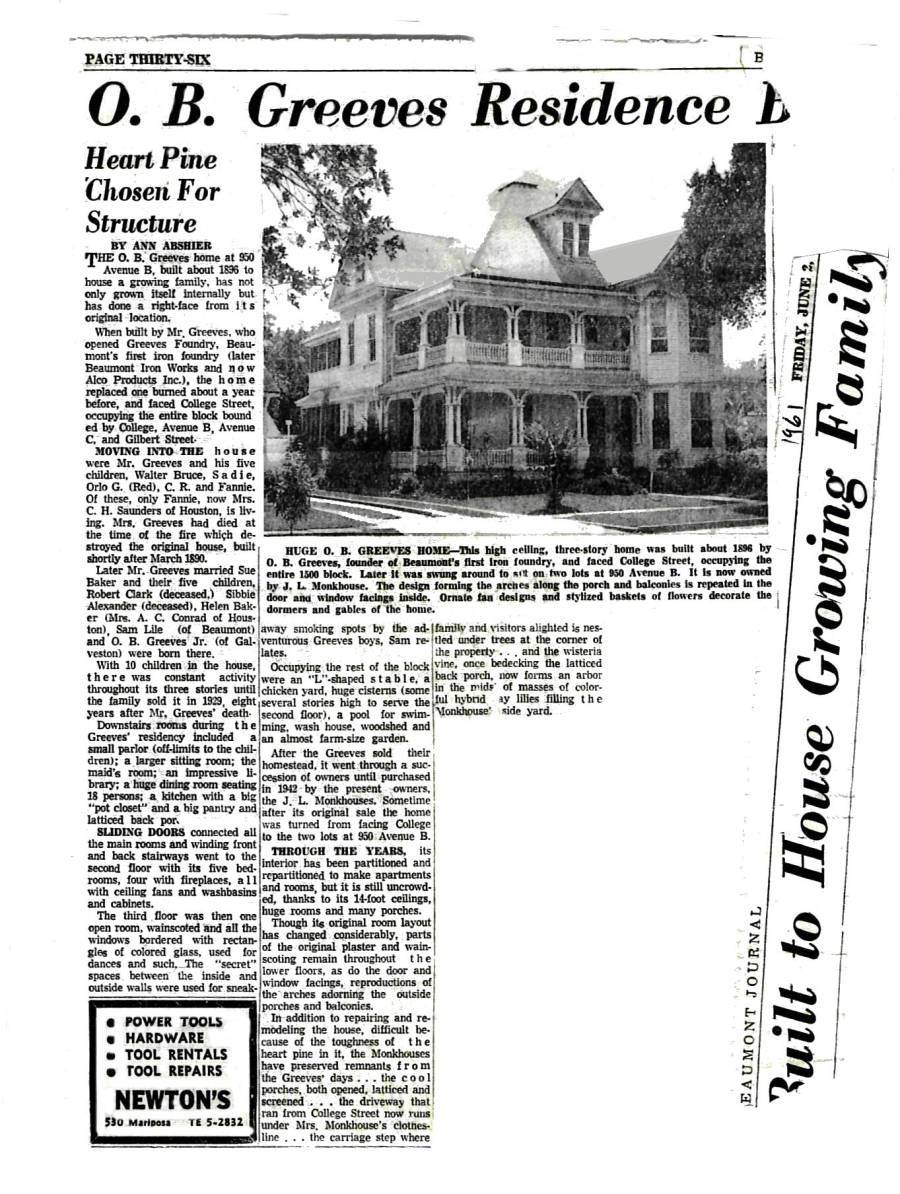Greeves
Murray
The known
history of the Greeves side of the Saunders family begins on New Year's
Day, 1821 in Dunrobin, Scotland with the birth of Robert Murray who was
to become the grandfather of Fanny Greeves Saunders, daughter of Orlo Bruce
Greeves. Robert Murray immigrated to Nova Scotia, Canada in
an undetermined year where he met and married Annie Sutherland who was
born on September 15, 1829 in Coalcester County, Nova Scotia, Canada.
Born to them on May 15, 1854 was Annie Murray, also in Coalcester County,
Nova Scotia, Canada - who was to become the wife of Orlo Bruce Greeves,
and mother of Fanny Greeves Saunders. (Here there is a possible connection
to Canadian actor Donald Sutherland and his son Keifer.)
Orlo Bruce
Greeves, was born December 21, 1856 in Fredericton, New Brunswick, Canada.
He was later to marry Annie Murray, move to Beaumont, Texas, and become
the patriarch of a large and prosperous family. Orlo Bruce Greeves
would found an iron works, invest in Spindletop, first major oil strike
west of the Mississippi, and become a wealthy man and leading community
member. His youngest child by his first wife Annie, who would later
die tragically from injuries sustained in a house fire, was Fanny Greeves
Saunders who would later marry Clifford Henry Saunders, brother of Myrtle
Saunders, the author of the lengthy and detailed information contained
in the Saunders section of the web site.
Much of
the Greeves history is pictorial and word of mouth from generation to generation.
Fortunately, being Scotch, the family was "clannish" with family members
keeping close contact with each other and everyone hearing all the same
stories and committing them to memory. I, James R. Saunders Jr.,
was fortunate enough to have known many of the older generations well and
to have heard these stories and commit them to memory. Many will
be presented subsequently along with pictures to give "flesh" to the spoken
/ written word. These "oldsters" were fixtures in my early life and
into young adulthood (I was born in 1949) and hearing all these old stories
was fascinating to me every time they were told and retold at every family
gathering on Christmas, Thanksgiving, Easter, Mother's Day, etc...
We were "clannish" and spent a lot of time socializing with each other.
I feel sorry for others who never experienced the depth of family I did
with members from five generations often present at one event simultaneously.
To me, it seems like I know people well who died before I was born.
I have
come to cherish this sense of continuity and wish to share it with you
now.

The picture
above is the original O. B. Greeves home in Beaumont, Texas. It was
taken Easter Sunday - April 14, 1895. I'm sure it was an idyllic
time for the Greeves family. They had wealth and all that goes with
wealth. This was without doubt the home of wealthy people as they
were in 1895. An examination of the relative size of persons to the
house demonstrates it was very large with much still hidden behind the
visible part. I know from stories that a stable, barn, tack room,
and sizable garden existed just out of sight. The intricate carved
moldings on the edges of the home and front porch show that this house
had all the "bells and whistles" for a house of the time.
On the
left of the front porch, holding the baby, is Orlo Bruce Greeves who was
39 at this time. The baby is Fanny Greeves, later to become Fanny
Saunders. The two ladies closest to him are unknown, but probably
sisters of his wife, Annie Greeves, seated in the middle of the porch.
The children in front are from right to left: Bruce, Sadie, Carnie, and
Olie. The child at far left is unknown.
It is
very sad that great tragedy awaited all these people in the near future.
A little over a year later, in 1896, Annie Greeves would sustain injuries
that would shortly thereafter take her life when this house caught fire
in the kitchen. Being a very proper and well heeled lady, Annie was
dressed in the encumbering heavy dress with multiple petticoats common
to ladies of means at the time. Her clothes caught fire and by the
time they were extinguished she was mortally injured. Her son Carnie
witnessed this horrific event and was haunted by the sight for the remainder
of his life.
Shortly
after this fire Orlo Bruce built a new home in downtown Beaumont and married
a second time to Sue Baker. They had five children together: Sybil,
Bob, Sam, Helen, and O.B. Since Orlo and Bruce had already been used
in the names of other children, O.B. was just named O.B. with the letters
not being short for anything. He spent much of his life explaining
this to people. The new home, which ironically was always referred
to as the "old home" by the younger set of children, was very swanky for
the time. It is still in existence today (2007). However, the
third story has been removed and it has been turned on the lot from its'
original orientation. During the time the Greeves owned it, the house
sat alone on an entire block of land. Later this land was gradually
divided into lots and other houses were built around the home until it
took on the appearance of a conventional neighborhood.
The article
following was published in the local Beaumont newspaper in the early 1960s.
It explains much. It is entirely factual and well researched.
Read it, and then read on.

Current
photographs of the second "old home" are available in an excellent photographic
essay compiled by Lisa Saunders Baugh while on a business trip to Beaumont
in September of 2007. This photo essay well documents the Greeves
grave plot in Magnolia Cemetery as well as the "old home". A link
to this photo essay will be found immediately below.
The history
of the Greeves family will be told with text and photographs in another
section. It will include photographs from the 1800s to modern days,
living memories committed to writing, and anecdotal information passed
from generation to generation. I hope you enjoy it. (James
R. Saunders Jr. 2007)
HOME
PAGE GREEVES LINK
PAGE LISA
SAUNDERS BAUGH PHOTO ESSAY
|

